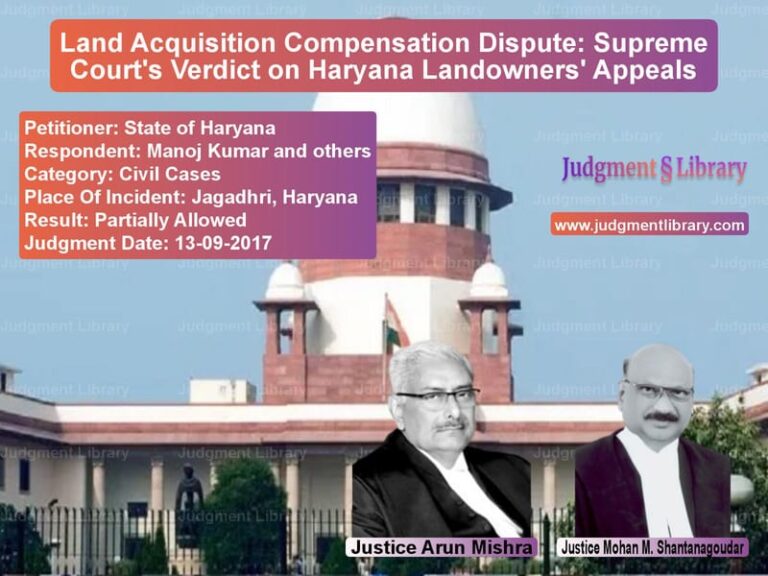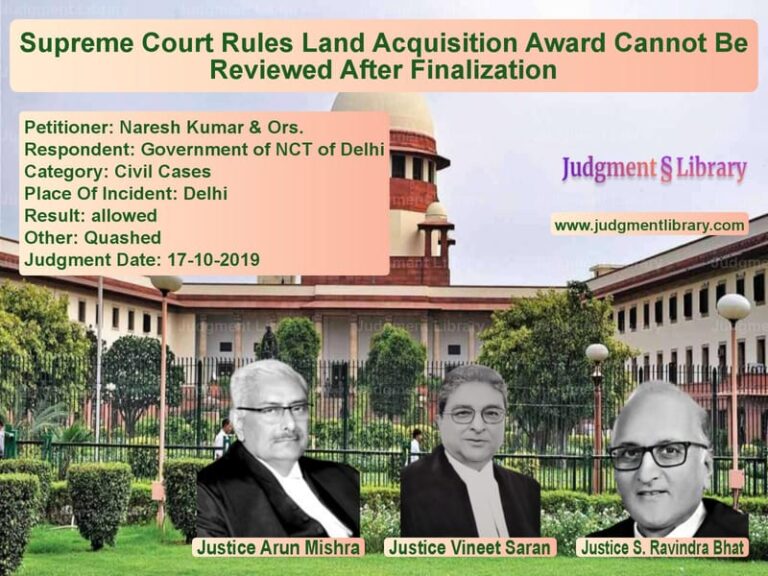Supreme Court Reinstates Candidates in Jharkhand Civil Services Exam Dispute
The Supreme Court of India delivered a significant judgment in the case of Barun Kumar & Others vs. State of Jharkhand & Others on August 25, 2022. The judgment concerns the 6th Combined Civil Services Examination, 2016, conducted by the Jharkhand Public Service Commission (JPSC), where appointments of selected candidates were challenged in the Jharkhand High Court. The Supreme Court overturned the High Court’s decision, reinstating the selected candidates and restoring their appointments.
The ruling primarily addressed the interpretation of qualification criteria in the exam process and the applicability of judicial review in service matters. It emphasized that changes in the selection process should not unfairly affect candidates who had already been selected and appointed.
Background of the Case
The Jharkhand Public Service Commission (JPSC) conducted the 6th Combined Civil Services Examination under the Bihar Civil Services (Executive Branch) and Bihar Junior Civil Services (Recruitment) Rules, 1951. This examination was held after a series of revisions to the examination pattern, based on recommendations from an expert committee chaired by V.S. Dubey, IAS (Retd.). The modifications included changes in the qualifying marks and the evaluation system.
Read also: https://judgmentlibrary.com/supreme-court-upholds-pension-rule-in-tripura-civil-services-case/
The recruitment process consisted of:
- Preliminary Examination: Two objective-type papers.
- Main Examination: Six descriptive papers.
- Interview: Conducted based on the results of the main examination.
Following the final selection, the successful candidates were appointed to various posts between June and July 2020. However, some unsuccessful candidates challenged the process, leading to multiple legal battles.
High Court Proceedings
Several petitions were filed before the Jharkhand High Court, challenging the selection process on the ground that the marks obtained in Paper-I (General Hindi & English) were incorrectly included in the total marks, affecting the merit list.
The High Court ruled that:
- Marks from Paper-I should not be included in the final merit list.
- Only candidates securing minimum qualifying marks in each of the other five papers should be considered.
- A fresh merit list should be prepared.
As a result of this ruling, the appointments of 326 selected candidates were set aside.
Arguments Before the Supreme Court
Petitioners’ (Selected Candidates) Arguments
The appointed candidates, represented by Senior Advocates Dr. A.M. Singhvi and Mr. Dushyant Dave, challenged the High Court’s ruling on the following grounds:
- Past Precedents: The JPSC had consistently followed a selection process where the total marks were considered, including Paper-I.
- Unfair Changes: The High Court’s decision altered the merit list retrospectively, causing unjustified dismissal of appointed officers.
- Judicial Overreach: The courts should not interfere with the executive’s decision unless it is arbitrary or illegal.
- Service Disruptions: The affected candidates had already undergone training and had been working in government service for two years.
Respondents’ (Unsuccessful Candidates) Arguments
The respondents, represented by Senior Advocates Mr. C.S. Sundaram and Mr. V. Giri, argued:
- Violation of Advertisement Terms: Paper-I was supposed to be qualifying and should not have been included in merit calculations.
- Merit-Based Selection: Only those securing the minimum qualifying marks in each of the other five papers should be selected.
- Equity in Examination: The petitioners’ selection was based on an incorrect evaluation system.
Supreme Court’s Observations and Ruling
1. Judicial Restraint in Recruitment Processes
The Supreme Court emphasized that courts should not interfere in the recruitment process unless there is a clear illegality:
“The settled practice followed by the Commission for years cannot be changed abruptly based on an alternative interpretation of rules.”
2. Validity of Past Selection Methods
The Court ruled that the JPSC’s existing method of calculating merit based on total marks, including Paper-I, was reasonable and should not be altered retrospectively:
“The interpretation given by the High Court unsettles a long-standing practice and creates unnecessary disruptions.”
3. Impact on Appointed Candidates
The judgment highlighted that the selected candidates had completed probation and were already in service:
“Service appointments cannot be casually disturbed, especially when candidates have already been trained and posted in their respective jobs.”
4. Dismissal of High Court’s Ruling
The Supreme Court quashed the High Court’s decision and reinstated the affected officers:
“The appeal is allowed. The impugned judgment of the High Court dated February 23, 2022, is hereby quashed and set aside.”
Implications of the Judgment
The Supreme Court’s decision has far-reaching effects on government recruitment and service law:
- Ensures Stability in Government Appointments: Prevents disruption of appointments based on post-selection legal disputes.
- Limits Judicial Overreach: Reinforces that courts should avoid interfering in policy matters unless there is an evident illegality.
- Protects Rights of Selected Candidates: Ensures that selected candidates are not arbitrarily removed due to later reinterpretations of rules.
- Prevents Frequent Changes in Selection Criteria: Encourages consistency in examination rules to maintain fairness for aspirants.
Conclusion
The Supreme Court’s judgment in Barun Kumar & Others vs. State of Jharkhand is a landmark ruling reinforcing the principles of stability in government appointments. By setting aside the High Court’s order, the Court ensured that candidates who had been selected and appointed were not unfairly penalized due to subsequent legal challenges.
The ruling highlights the necessity of judicial restraint in service matters and ensures that recruitment processes are not subject to arbitrary changes after their conclusion.
Petitioner Name: Barun Kumar & Others.Respondent Name: State of Jharkhand & Others.Judgment By: Justice Ajay Rastogi, Justice C.T. Ravikumar.Place Of Incident: Jharkhand.Judgment Date: 24-08-2022.
Don’t miss out on the full details! Download the complete judgment in PDF format below and gain valuable insights instantly!
Download Judgment: barun-kumar-&-others-vs-state-of-jharkhand-&-supreme-court-of-india-judgment-dated-24-08-2022.pdf
Directly Download Judgment: Directly download this Judgment
See all petitions in Recruitment Policies
See all petitions in Public Sector Employees
See all petitions in Promotion Cases
See all petitions in Judgment by Ajay Rastogi
See all petitions in Judgment by C.T. Ravikumar
See all petitions in allowed
See all petitions in Quashed
See all petitions in supreme court of India judgments August 2022
See all petitions in 2022 judgments
See all posts in Service Matters Category
See all allowed petitions in Service Matters Category
See all Dismissed petitions in Service Matters Category
See all partially allowed petitions in Service Matters Category







